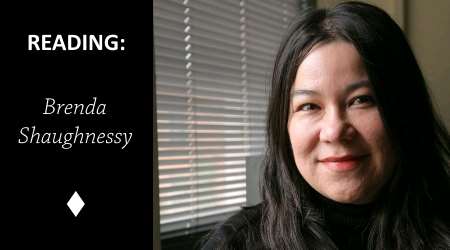Brenda Shaughnessy (b.) is an American poet. She wrote Interior with Sudden Joy (1999), Human Dark with Sugar (2008). She is currently an associate professor of English at Rutgers University-Newark. I have discovered some of her poems and I’m really impressed. Here I read ‘Project for a Fainting’ but make sure you also read ‘Dear Gonglya‘.
Project for a Fainting
Oh, yes, the rain is sorry. Unfemale, of course, the rain is
with her painted face still plain and with such pixel you’d never seeit in the pure freckling, the lacquer of her. The world
is lighter with her recklessness, a handkerchief so wet it is clear.To you. My withered place, this frumpy home (nearer
to the body than to evening) miserable beloved. I lie tenderand devout with insomnia, perfect on the center pillow past
midnight, sick with the thought of another yearof waking, solved and happy, it has never been this way! Believe
strangers who say the end is close for what could be closer?You are my stranger and see how we have closed. On both ends.
Night wets me all night, blind, carried.And watermarks. The plough of the rough on the slick,
love, a tendency toward fever. To break. To soil.Would I dance with you? Both forever and rather die.
It would be like dying, yes. Yes I would.I have loved the slaking of your forgetters, your indifferent
hands on my loosening. Through a thousand panes of glassnot all transparent, and the temperature.
I felt that. What you say is not less than that.
From the first lines, we hear mastery of the language. Precise metaphors, alliterations, the rhythm works. Rain painted plain pixel. Freckling recklessness handkerchief. Etcetera. In some of her other poems the wordplay is too much, but here I find it nicely balanced.
When she goes on to relate her experience of a love it feels like I’m reading Sylvia Plath. There is a lot to explore. Nearer to the body then to evening, lying ‘devout with insomnia’. The ‘end is close’ and then the ‘closed on both ends’ could sound a little far-fetched, but okay. A line like ‘night wets me all night’ is very pretty. The plough of the rough on the slick is also beautiful. And the compact ‘Both forever and rather die’, it just sounds so good. The toughness of love that breaks and soils and has a tendency to fever, is celebrated
In the end she observes the lover, I think, through opaque and transparent panes of glass. The last line ‘What you say is not less than that’ is spellbinding. What does that sentence to there? How can ‘you’ say something that is not less than the most personal innermost feeling of the poet? Is she referring to something the ‘you’ actually did say to her, and is this poem an answer to that? How can she know that ‘you’ referred to feelings that are ‘not less’ than those she experienced? I think here we encounter te most fundamental wager of love. We must believe that what is said to us (we ‘are spoken’, according to Heidegger) is not less than what we are capable of feeling in our own heart.

One thought on “Reading: Project for a fainting by Brenda Shaughnessy”
Comments are closed.